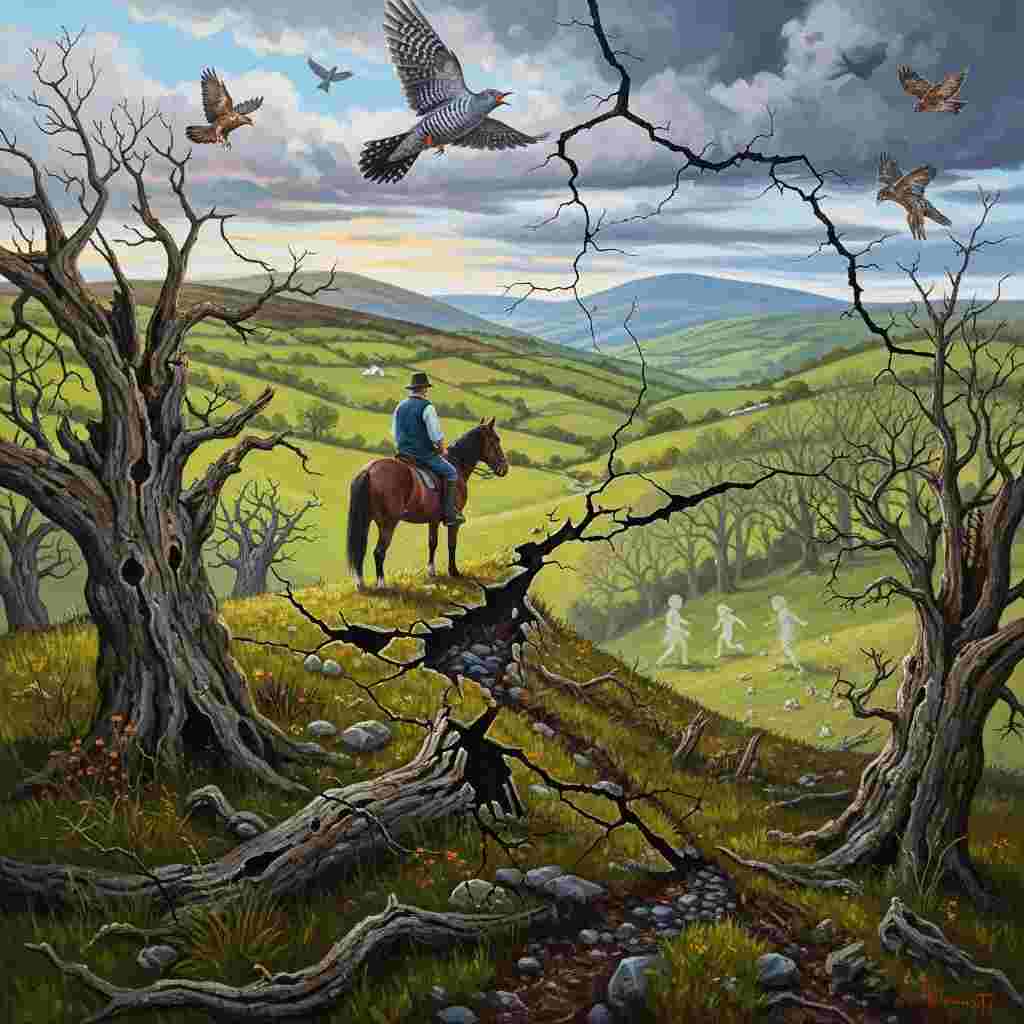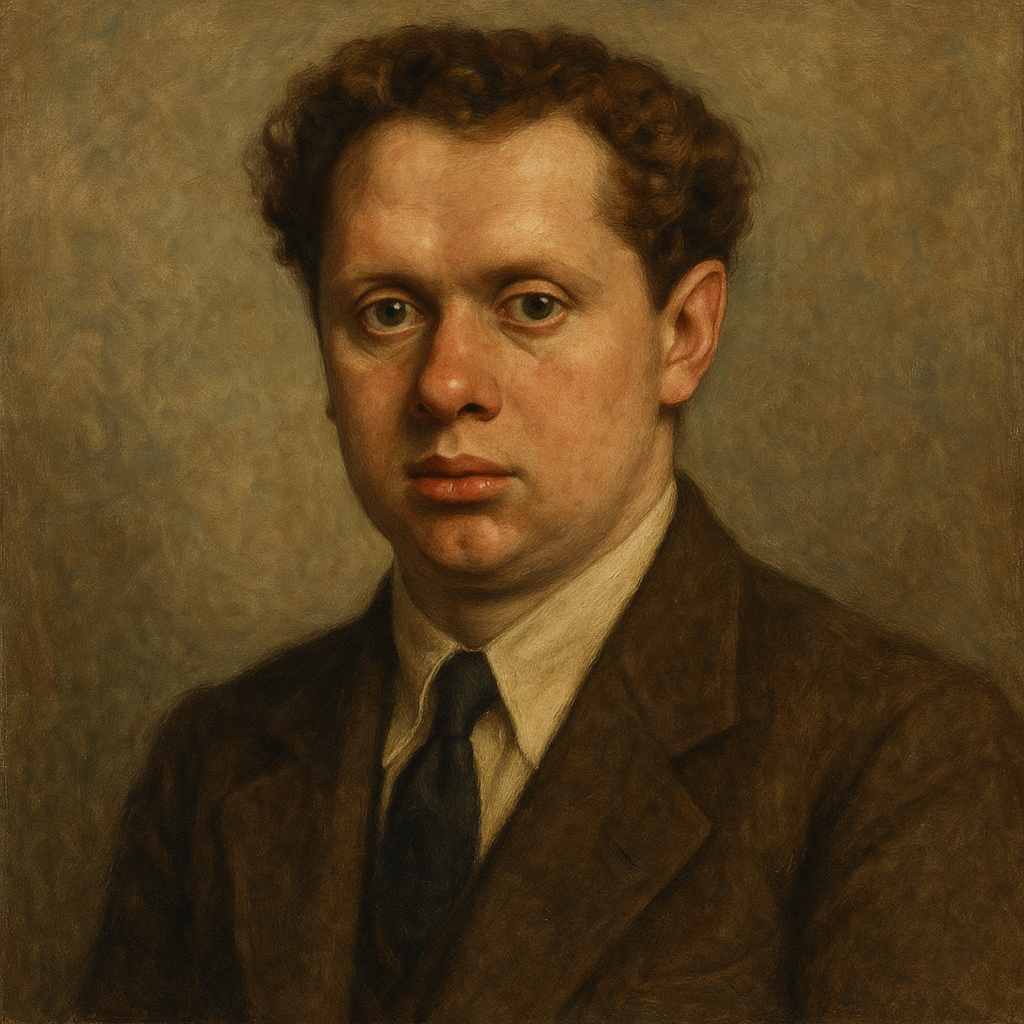Hold hard, these ancient minutes in the cuckoo’s month
Dylan Thomas
1914 to 1953

Want to track your favorites? Reopen or create a unique username. No personal details are required!
Hold hard, these ancient minutes in the cuckoo’s month,
Under the lank, fourth folly on Glamorgan’s hill,
As the green blooms ride upward, to the drive of time;
Time, in a folly’s rider, like a county man
Over the vault of ridings with his hound at heel,
Drives forth my men, my children, from the hanging south.
Country, your sport is summer, and December’s pools
By crane and water-tower by the seedy trees
Lie this fifth month unskated, and the birds have flown;
Hold hard, my country children in the world of tales,
The greenwood dying as the deer fall in their tracks,
This first and steepled season, to the summer’s game.
And now the horns of England, in the sound of shape,
Summon your snowy horsemen, and the four-stringed hill,
Over the sea-gut loudening, sets a rock alive;
Hurdles and guns and railings, as the boulders heave,
Crack like a spring in a vice, bone breaking April,
Spill the lank folly’s hunter and the hard-held hope.
Down fall four padding weathers on the scarlet lands,
Stalking my children’s faces with a tail of blood,
Time, in a rider rising, from the harnessed valley;
Hold hard, my county darlings, for a hawk descends,
Golden Glamorgan straightens, to the falling birds.
Your sport is summer as the spring runs angrily.
Dylan Thomas's Hold hard, these ancient minutes in the cuckoo’s month
Dylan Thomas’s "Hold Hard, These Ancient Minutes in the Cuckoo’s Month" is a dense, evocative meditation on time, nature, and the inexorable passage of seasons. Written in Thomas’s characteristically lush and rhythmic style, the poem blends personal reflection with mythic grandeur, situating human experience within the vast, indifferent cycles of the natural world. This essay will explore the poem’s historical and cultural context, its intricate literary devices, its central themes, and its emotional resonance, while also considering its place within Thomas’s broader body of work.
Historical and Cultural Context
To fully appreciate Thomas’s poem, one must first understand the milieu in which it was written. Born in 1914 in Swansea, Wales, Thomas was deeply influenced by the landscapes of Glamorgan, the region referenced in the poem. The Welsh countryside, with its rolling hills, ancient folklore, and industrial encroachments, serves as both setting and symbol in much of his work. The 1930s and 1940s—when Thomas wrote most of his poetry—were marked by economic depression, the looming threat of war, and a broader cultural anxiety about modernity’s impact on tradition.
Thomas’s poetry often resists the stark realism of his contemporaries (such as W.H. Auden or Stephen Spender), instead embracing a neo-Romantic sensibility that privileges myth, sound, and sensory richness. "Hold Hard, These Ancient Minutes..." exemplifies this tendency, weaving together pastoral imagery with a sense of foreboding. The "cuckoo’s month"—typically April or May, when the cuckoo’s call heralds spring—becomes a site of tension between renewal and decay, a motif that recurs throughout Thomas’s oeuvre.
Literary Devices and Structure
Thomas employs a wealth of literary devices to create a poem that is as sonically rich as it is thematically layered.
1. Imagery and Symbolism
The poem is saturated with vivid, often paradoxical imagery. The "lank, fourth folly on Glamorgan’s hill" suggests both a physical structure (perhaps a ruin or a folly, an ornamental building with no practical purpose) and a metaphorical one—human endeavors rendered absurd by time. The "green blooms" riding upward evoke spring’s vitality, yet they do so under the "drive of time," implying an inevitable progression toward death.
Thomas frequently juxtaposes natural and human-made elements: "crane and water-tower" stand beside "seedy trees," illustrating the intrusion of industrialization into the pastoral. The "horns of England" summon "snowy horsemen," a possible allusion to Arthurian legend, reinforcing the poem’s mythic undertones.
2. Personification and Mythic Time
Time is personified as a relentless force—a "rider" or "hunter" who drives forth the speaker’s "men" and "children." This aligns with Thomas’s broader preoccupation with time as both creator and destroyer. The poem’s temporal structure is nonlinear, blending past ("ancient minutes"), present ("this fifth month"), and future ("the summer’s game") to suggest cyclical rather than linear progression.
3. Paradox and Juxtaposition
Thomas delights in paradoxes: "the greenwood dying as the deer fall in their tracks" suggests simultaneous vitality and decay. The phrase "bone-breaking April" is particularly striking—April, traditionally associated with rebirth, is here rendered violent, even deadly. Such contradictions reinforce the poem’s central tension between beauty and destruction.
4. Sound and Rhythm
Though this analysis avoids discussing rhyme, Thomas’s use of assonance, consonance, and alliteration cannot be ignored. Phrases like "hurdles and guns and railings" and "Crack like a spring in a vice" create a percussive, almost incantatory rhythm, reinforcing the poem’s urgent tone.
Themes
1. Time’s Dual Nature
The poem’s most prominent theme is time’s duality—it is both generative and destructive. The speaker implores the reader to "hold hard" to fleeting moments, yet time is an unstoppable force, a "rider" who "drives forth" the speaker’s loved ones. This tension mirrors Thomas’s own fraught relationship with mortality, a theme that dominates his work (most famously in "Do Not Go Gentle Into That Good Night").
2. Nature and Human Intervention
The Welsh landscape is depicted as both idyllic and besieged. The "seedy trees" and "unskated" pools suggest neglect or decay, while industrial elements ("water-tower," "railings") intrude upon the natural world. Thomas does not romanticize nature; instead, he presents it as a site of struggle, where beauty and violence coexist.
3. Myth and Modernity
The poem’s references to folklore ("the world of tales") and Arthurian imagery ("snowy horsemen") contrast with its modern, almost apocalyptic vision ("hurdles and guns and railings"). This juxtaposition suggests a loss of innocence, a theme that resonates with interwar anxieties about cultural and environmental degradation.
4. Parental Anxiety and Loss
The repeated address to "my country children" and "my county darlings" imbues the poem with a sense of protective urgency. The speaker seems to mourn the inevitable loss of youth and innocence, a sentiment that may reflect Thomas’s own fears as a father (he wrote much of his poetry while his children were young). The "hawk descends" in the final stanza reinforces this predatory threat, suggesting that no idyll lasts forever.
Emotional Impact
Thomas’s poem is emotionally charged, blending nostalgia, dread, and a fierce, almost desperate love for the natural world. The imperative "Hold hard" recurs like a refrain, underscoring the speaker’s urgency. There is a palpable sense of struggle—against time, against encroaching modernity, against the inevitability of loss.
The poem’s closing lines—"Your sport is summer as the spring runs angrily"—encapsulate its central paradox. Summer, traditionally a time of abundance, is framed as mere "sport," a fleeting joy, while spring, typically a season of renewal, "runs angrily," suggesting turbulence rather than rebirth. This unresolved tension leaves the reader with a sense of unease, a recognition of life’s fragility.
Comparative and Philosophical Perspectives
Thomas’s work often invites comparison with other poets who grapple with time and nature. His dense, musical style shares affinities with Gerard Manley Hopkins, particularly in its sprung rhythm and ecological concerns. Like Hopkins, Thomas finds the divine (or at least the sublime) in nature, though his vision is more fatalistic.
Philosophically, the poem aligns with existentialist ideas about time’s inexorability. There are echoes of Heidegger’s "Being and Time" in the way Thomas portrays human existence as fundamentally temporal, always moving toward an uncertain future. Yet, unlike existentialist writers who embrace absurdity, Thomas seems to mourn time’s passage, clinging to moments of beauty even as they slip away.
Conclusion
"Hold Hard, These Ancient Minutes in the Cuckoo’s Month" is a masterful exploration of time’s dual nature, blending lush imagery with profound existential dread. Through its intricate literary devices, mythic undertones, and emotional urgency, the poem captures the tension between human transience and the eternal cycles of nature. Thomas does not offer consolation; instead, he demands that we confront the fleetingness of life with both defiance and reverence. In doing so, he creates a work that is as haunting as it is beautiful, a testament to poetry’s power to articulate the ineffable.
For readers today, the poem remains a poignant reminder of our own precarious place within time’s vast machinery—an invitation to "hold hard" to the moments we have, even as they slip through our fingers.
This text was generated by AI and is for reference only. Learn more
Want to join the discussion? Reopen or create a unique username to comment. No personal details required!



Comments
No comments yet. Be the first to comment!